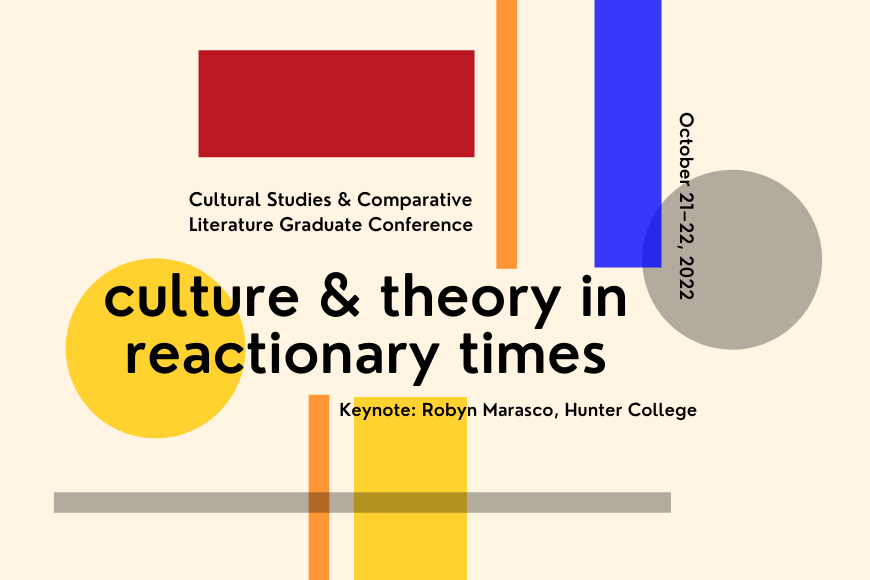2022 Graduate Conference: Culture and Theory in Reactionary Times
216 Pillsbury Dr. SE
Minneapolis,
MN
55455
Friday, October 21st:
5:15-5:30: Opening remarks
5:30-7:00: Keynote—Professor Robyn Marasco, Hunter College (CUNY), Nicholson 135 presenting "Beyond Ethics and Economics: Feminism Returns to the Family"
7:15 onwards: Opening reception / dinner in Nicholson 135
Saturday, October 22nd:
9:30-10:00: Breakfast in Nicholson 135
10:00-11:15: Panel #1 – “Reactionary Discourse: France, U.S., China” – Moderated by Joe Sannicandro
- Patrick Lyons – French, University of California, Berkeley, “Pillaging the Paris Commune: Nicolas Chaudun’s The Blaze: The Louvre Set Ablaze by the Commune (2015) and the French Literary Right”
- Marie Sanazaro – Comparative Literature, Princeton University, “Hillbilly Elegy in Context: Reading J.D Vance as a Social Problem Novelist”
- Chelsea Wenzhu Xu – Cultural Studies, George Mason University, “Against Women’s Fist: A Qualitative Content Analysis of Antifeminist and Nationalistic Discourse in China”
11:15-11:30: Break
11:30-12:30: Panel #2 – “The Psychology of Reaction” – Moderated by Olga Tchepikova-Treon
- Reuben Martens – Communication Arts, University of Waterloo, “The Rise of American Loneliness: A Politics of Totalitarianism?”
- Shaun Terry – History of Consciousness, University of California, Santa Cruz, “Modern Dialectical Intensification and Fascist Subjectivity”
12:30-1:45: Lunch break (independent)
1:45-3:00: Panel #3 – “Ideology, Narrative, Text” – Moderated by Alya Ansari
- Carson Welch – Literature, Duke University, “Collectivity as Character After The Black Jacobins”
- Iris Morrell – Comparative Literature, University of California, Irvine, “Images in Excess of the Law: Censorship, Photography and Traumatic Testimony Under Reactionary Governance"
- Chad Szalkowski-Ference – English, Duquesne University, “‘It Could Be Algorithmic Governance’: Paranoia, Narrative, and the Algorithm in Contemporary World Literature”
3:00-3:15: Break
3:15-4:30: Panel #4 – “Representation in the Inverted World” – Moderated by Kyle Baasch
- Cara Greene – Philosophy, University of New Mexico, “The Genesis of a False Dichotomy: A Critique of Conceptual Alienation”
- Kyle Proehl – Comparative Literature, University of California, Davis, “Notes on Graffiti and Social Explosion”
- Chris Carlton – Comparative Literature, Binghamton University, “The Problem of Ideology-Critique for Literary Representation”
4:30-4:45: Closing remarks
How do we study culture in reactionary times? Dominant critical approaches to culture in the
humanities and interpretive social sciences in recent years have tended to focus on the
“neoliberal” values and subjectivities produced by contemporary capitalist society, from the
precarious laborer in the gig economy to the brazen opportunism of the “professional-managerial class.” However, it appears that the cultural and political situation has decisively changed, and the immediate future of modern democratic societies is less likely to be a springtime of rampant consumerism and liberal individualism than a “polar night of harsh and icy darkness, no matter which group may triumph on the surface,” as Max Weber chillingly prophesied at the dawn of the Weimar Republic. Our conference aims to explore old and new theoretical perspectives that can help make sense of the reactionary cultural climate that has exploded in recent years and shows no sign of abating: extreme conservative social values; racial prejudice; ethnonationalism; religious fundamentalism; and anti-liberal sentiment in the broadest sense.
Our keynote speaker is Dr. Robyn Marasco, currently an Associate Professor of Political Science at Hunter College and The CUNY Graduate Center. Her research has focused on developing the insights of critical theory, feminism, and psychoanalysis for political theory and interpretive social science. Her first book, The Highway of Despair: Critical Theory after Hegel (Columbia UP, 2015), reconstructs the emancipatory project of critical theory around the idea of negative dialectics. Professor Marasco was the guest editor of a special issue of South Atlantic Quarterly on “The Authoritarian Personality” and her current book project, Critique, Politics, and the Family, explores the distinctly political concept of the family in twentieth-century critical theory.
